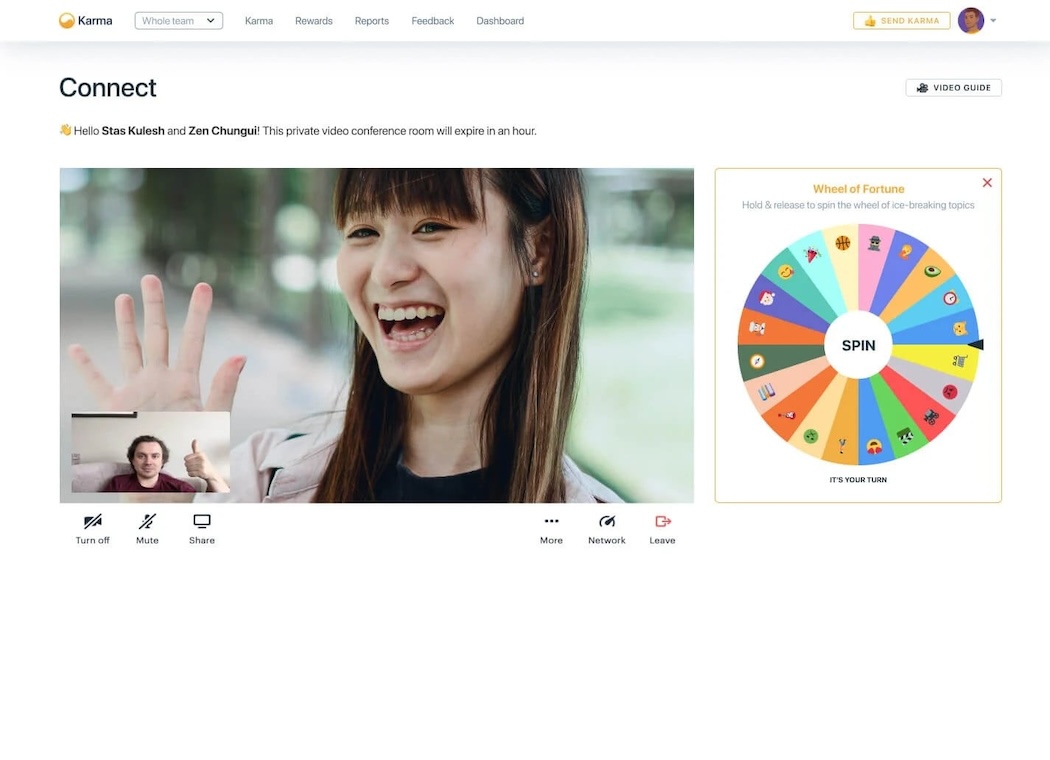In the rapidly evolving work landscape, fostering strong relationships within teams is no longer just a “nice to have” – it’s a business necessity. As remote work becomes more common and hybrid workplaces emerge, finding meaningful ways to nurture connections between employees is critical. While traditional team meetings and group chats serve their purpose, there’s one simple, yet powerful tool that’s proving to have a profound impact on team dynamics: 1-on-1 video calls.
When executed effectively, these calls can go a long way in fostering communication, building trust, and creating a supportive work environment. But how exactly do 1-on-1 video calls strengthen employee-employee relationships? Let’s explore this question and discuss how platforms like Karma can facilitate these meaningful interactions.
The Power of 1-on-1 Video Calls
In-person interactions are essential for building relationships, but the virtual workplace has forced organizations to adapt. As a result, video calls have emerged as the next best thing to face-to-face communication. Let’s look at some compelling reasons why 1-on-1 video calls are such a game-changer for employee relationships.
1. Creating a Sense of Personal Connection
The core of any successful team is the personal connection between its members. Regular 1-on-1 video calls allow employees to engage with each other on a deeper level, not just as coworkers, but as individuals. By seeing each other’s faces, non-verbal cues, and body language, employees can better understand each other’s emotions and personalities. This sense of connection helps break down barriers and makes remote colleagues feel more present, despite the physical distance.
Research conducted by Harvard Business Review found that 72% of employees believe that regular one-on-one interactions with managers or colleagues enhance trust and engagement. By prioritizing these connections, companies can create an environment where employees feel more comfortable sharing ideas, voicing concerns, and collaborating on projects.
2. Improving Communication and Reducing Misunderstandings
Communication is the cornerstone of any productive workplace. But when team members are working remotely, it’s easy for messages to be lost in translation, especially in a text-based environment. Email or chat messages can be misinterpreted, and employees may be hesitant to ask for clarification, which can lead to confusion and frustration.
Video calls bridge that gap by allowing employees to engage in real-time conversations with a personal touch. By speaking face-to-face, even virtually, employees are more likely to express themselves clearly and ask follow-up questions, leading to fewer misunderstandings. In fact, studies show that people are 30% more likely to retain information when it’s communicated through video rather than just text.
Moreover, video calls foster an open and transparent environment, where employees can share ideas and feedback more comfortably. This increases the flow of information across the team, which is essential for project success.
3. Building Trust and Rapport
Trust is an essential component of any relationship, and that’s especially true in the workplace. Without trust, collaboration falters, and team members may feel isolated. Regular 1-on-1 video calls build trust by creating a space where employees can engage in honest and open conversations.
According to a Gallup poll, employees who have meaningful one-on-one conversations with their managers are 3 times more likely to feel engaged and motivated in their work. These calls not only strengthen relationships between employees and managers but also between coworkers, as they create an opportunity to offer support, provide constructive feedback, and celebrate successes.
Over time, these consistent video calls can help employees build rapport and create a culture of mutual respect and understanding. This rapport enhances collaboration, leading to improved performance and a more harmonious work environment.
4. Encouraging Accountability and Responsibility
Regular 1-on-1 video calls help employees stay accountable and responsible for their tasks. When you’re working remotely, it can be easy to get distracted or procrastinate. A scheduled video call with a colleague or manager serves as a reminder to stay on track and ensure that work is progressing smoothly.
Through these calls, employees can discuss progress, set goals, and track outcomes. This consistent check-in process keeps everyone aligned and focused on achieving team objectives. Moreover, video calls provide a more personal accountability structure than emails or project management tools, which can sometimes feel impersonal or distant.
A study by McKinsey & Company revealed that teams with high accountability tend to perform 25% better than those without, highlighting how important it is to stay connected regularly.
Karma’s Connect Feature: Strengthening Employee Bonds
Now that we’ve explored why 1-on-1 video calls are so important, let’s talk about how Karma’s Connect feature can make it easier for your team to maintain these relationships.
The Connect feature in Karma is designed to foster regular 1-on-1 video calls, making it simple for employees to engage with each other, regardless of their location. Here’s how it works:
-
Scheduled 1-on-1 Video Calls: Karma automatically schedules regular 1-on-1 calls between random team members based on their app usage. These calls ensure that employees are connecting regularly without having to plan or schedule them manually.
-
Gamification and Points System: To encourage engagement, Karma rewards participants for spending the minimum required amount of time on their Connect calls. Employees earn points for taking the time to connect, which can be used for rewards or recognition. This gamification aspect makes it fun for employees to engage, while also reinforcing the value of regular, meaningful interactions.

Statistics Behind the Impact of 1-on-1 Calls
It’s not just theory – the impact of 1-on-1 video calls has been backed by numerous studies and statistics. Here are a few key figures that demonstrate how important these calls are for building employee relationships:
- 66% of employees say that receiving regular feedback, which is often delivered through one-on-one conversations, makes them feel more connected and valued at work (Source: Gallup).
- Teams with frequent 1-on-1 interactions report a 50% higher engagement level compared to those with infrequent or no personal check-ins (Source: SHRM).
- Employees who have regular video meetings are 40% more likely to feel more connected to their team, especially when working remotely (Source: Virtual Teamwork Study, 2022).
- 82% of workers who engage in regular 1-on-1s with their managers say they are more likely to stay with their current company (Source: Harvard Business Review).
Conclusion
1-on-1 video calls aren’t just a nice-to-have tool – they are essential for building strong, lasting relationships between employees. By improving communication, trust, and accountability, these calls help create an environment where employees feel supported and connected, even when working remotely. With platforms like Karma, scheduling these calls has never been easier, and the rewards and gamification elements ensure that employees stay motivated to engage.
By prioritizing regular 1-on-1 video calls and using tools like Karma to facilitate these connections, companies can build stronger, more cohesive teams that work together better and feel more connected to one another. And when employees feel connected, they’re more likely to be engaged, productive, and motivated – which ultimately leads to better outcomes for everyone involved.
Try out Karma for Slack with our demo and subscribe to your 30-day free trial:


 Why Real-Time Recognition Matters
Why Real-Time Recognition Matters